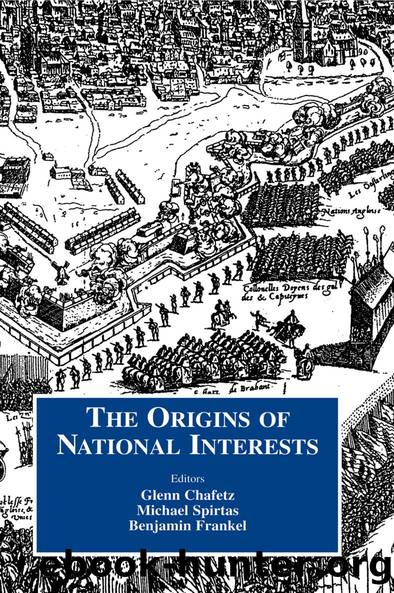Origins of National Interests by Glenn Chafetz Benjamin Frankel Michael Spirtaz

Author:Glenn Chafetz, Benjamin Frankel, Michael Spirtaz [Glenn Chafetz, Benjamin Frankel, Michael Spirtaz]
Language: eng
Format: epub
Tags: Nonfiction, History, Military, Social & Cultural Studies, Political Science
ISBN: 9781136327551
Publisher: Taylor and Francis
Published: 2012-10-12T04:00:00+00:00
NATO ENLARGEMENT:
A CONSTRUCTIVIST EXPLANATION
FRANK SCHIMMELFENNIG
At its Madrid summit in July 1997, NATO invited three central and eastern European (CEE) countries to accession talks: the Czech Republic, Hungary, and Poland. In December of the same year, the accession protocols were signed. In this article, I seek to explain NATO enlargement. More precisely, I ask (1) why CEE countries strive to become NATO members;1 (2) why NATO decided to expand to the east;2 and (3) why (only) the Czech Republic, Hungary, and Poland were invited to become NATO members.3
I argue that the most prominent rationalist international relations approaches to the study of alliances and international institutions cannot answer these questions convincingly. In both their neorealist and their neoliberal variations, they may be able to account for the CEE countriesâ bid to join NATO but fail to explain the interest of NATO in expansion (see âRationalist Puzzlesâ below). This puzzle for rationalism is solved by a constructivist approach to the study of international institutions which analyzes enlargement as a process of international socialization. In the constructivist perspective, NATO is a specialized organizationâthe âmilitary branchââof the Euro-Atlantic or Western community of liberal-democratic and multilateralist values and norms. The international socialization approach gives an answer to all three questions: (1) CEE countries strive for NATO membership inasmuch as they share the community values and norms and seek identification with, and recognition by, the West; (2) NATO decided to expand in order to strengthen liberal democracy and multilateralism and to build, in central and eastern Europe, a stable peace based on these values and norms. When a country has internalized the community values and norms and has changed its domestic and foreign policy practices accordingly, it is admitted as a full member to the organization as a reward for its efforts and because of the community's moral commitment to guarantee the security of countries that share its principled beliefs; (3) the Czech Republic, Hungary, and Poland were invited to join NATO first, because they were more advanced than the other CEE countries in the internalization of the community values and beliefs.
The constructivist explanation of enlargement as international socialization is backed up by an analysis of the enlargement process: In the section âEnlargement Discourse,â I show that the discourse of NATO and its members reflects the value-rational motivation for enlargement. Furthermore, the stages of enlargement, above all the PfP Program, fit the image of a process of socialization in which the Western alliance teaches its values and norms to its cooperation partners and evaluates their learning progress. The only facts that constructivism cannot explain (and are better accounted for by rationalism) are the bid to join NATO of rather authoritarian governments (like the Romanian government until 1996 and the Meciar government in Slovakia) and the exclusion of Slovenia from the first round of expansion.
The aim of the study is to give a convincing explanation of NATO enlargement. I do not claim to refute rationalist institutionalism in international relations theory. To begin with, the research design does not allow a thorough test of theories.
Download
This site does not store any files on its server. We only index and link to content provided by other sites. Please contact the content providers to delete copyright contents if any and email us, we'll remove relevant links or contents immediately.
Phoenicians among Others: Why Migrants Mattered in the Ancient Mediterranean by Denise Demetriou(595)
american english file 1 student book 3rd edition by Unknown(587)
Verus Israel: Study of the Relations Between Christians and Jews in the Roman Empire, AD 135-425 by Marcel Simon(585)
Caesar Rules: The Emperor in the Changing Roman World (c. 50 BC â AD 565) by Olivier Hekster(568)
Basic japanese A grammar and workbook by Unknown(552)
Europe, Strategy and Armed Forces by Sven Biscop Jo Coelmont(512)
Give Me Liberty, Seventh Edition by Foner Eric & DuVal Kathleen & McGirr Lisa(491)
Banned in the U.S.A. : A Reference Guide to Book Censorship in Schools and Public Libraries by Herbert N. Foerstel(479)
The Roman World 44 BC-AD 180 by Martin Goodman(469)
Reading Colonial Japan by Mason Michele;Lee Helen;(462)
DS001-THE MAN OF BRONZE by J.R.A(458)
The Dangerous Life and Ideas of Diogenes the Cynic by Jean-Manuel Roubineau(449)
Introducing Christian Ethics by Samuel Wells and Ben Quash with Rebekah Eklund(446)
Imperial Rome AD 193 - 284 by Ando Clifford(444)
The Oxford History of World War II by Richard Overy(444)
Catiline by Henrik Ibsen--Delphi Classics (Illustrated) by Henrik Ibsen(412)
Literary Mathematics by Michael Gavin;(406)
Language Hacking Mandarin by Benny Lewis & Dr. Licheng Gu(399)
Brand by Henrik Ibsen--Delphi Classics (Illustrated) by Henrik Ibsen(377)
